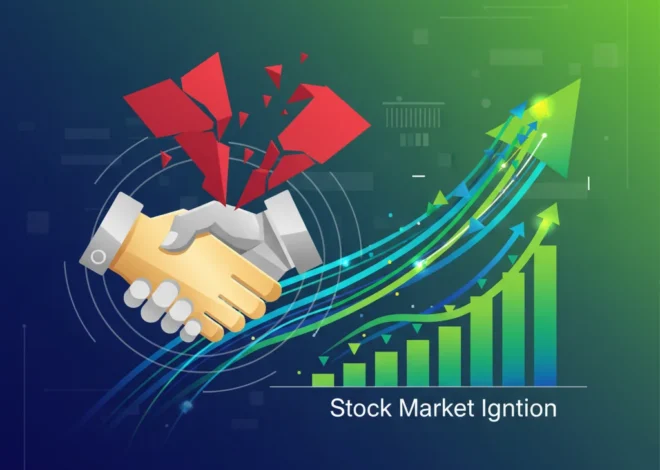
Economic Warfare: Unpacking the US Sanctions on Russia’s Energy Giants
The Intersection of Global Politics and Your Portfolio
In the intricate world of global finance, geopolitical tremors often send the most significant shockwaves through the stock market. A single government announcement can reshape investment landscapes, alter commodity prices, and force a complete re-evaluation of risk. A prime example of this dynamic is the deployment of economic sanctions, a powerful foreign policy tool that directly targets the financial lifeblood of a nation. The decision by the United States to impose sanctions on Russian energy behemoths like Rosneft and Lukoil, in response to aggression in Ukraine, serves as a critical case study in how political decisions translate into tangible economic consequences for the global economy.
These measures are far more than just headlines; they represent a calculated effort to exert pressure by constricting access to capital, technology, and international markets. For investors, finance professionals, and business leaders, understanding the mechanics and ripple effects of such sanctions is no longer optional—it’s essential for navigating the complexities of modern investing and international business. This article delves into the anatomy of these sanctions, their impact on the targeted entities, and the cascading effects on the global energy market, international banking, and the broader economic framework.
Anatomy of a Sanction: How Economic Pressure is Applied
At its core, an economic sanction is a penalty levied by one country or a coalition of countries on another to achieve specific foreign policy objectives. Unlike military action, sanctions operate within the domain of finance and commerce. They are the primary weapons in a form of economic warfare, designed to be precise yet powerful. The U.S. Department of the Treasury’s Office of Foreign Assets Control (OFAC) is the key agency responsible for administering and enforcing these measures, wielding a significant influence over global banking and trade (source).
Sanctions can take several forms:
- Asset Freezes: Blocking the assets of targeted individuals, companies, or even government entities held within the sanctioning country’s jurisdiction.
- Trade Restrictions: Prohibiting the import or export of certain goods, services, and technologies. In the case of energy companies, this can mean restricting access to crucial drilling technology.
- Capital Market Restrictions: Limiting the ability of sanctioned firms to raise money through debt or equity in the sanctioning country’s financial markets. This directly impacts their ability to fund new projects and manage existing debt.
- Banking Prohibitions: Cutting off targeted entities from the sanctioning country’s financial system, which, given the dominance of the U.S. dollar, can effectively isolate them from a large portion of global finance.
When applied to state-owned or state-critical companies like Rosneft, these measures aim to cripple the revenue streams that fund the government’s activities, thereby imposing a direct cost for its political and military actions.
Beyond the Boardroom: Sweden's Blueprint for Investor Power in the Digital Age
The Targets: Why Russia’s Energy Sector is in the Crosshairs
To understand the gravity of the sanctions, one must appreciate the monumental role Rosneft and Lukoil play in the Russian economy. They are not just companies; they are pillars of the state’s power and primary sources of its foreign currency earnings. Russia’s federal budget is heavily dependent on revenues from oil and gas exports, making the energy sector the nation’s economic center of gravity. According to reports from the International Energy Agency, oil and gas revenues have historically accounted for as much as 45% of Russia’s federal budget (source).
Targeting these giants is a strategic move to maximize economic pain. Rosneft, as a state-owned enterprise, is a direct instrument of the Kremlin. Lukoil, while nominally private, operates within the strategic interests of the Russian state. By hindering their operations, the U.S. aims to directly impact the Russian government’s ability to finance its military and stabilize its economy.
Here is a brief comparison of the two energy giants to illustrate their scale:
| Metric | Rosneft | Lukoil |
|---|---|---|
| Ownership Structure | State-owned (majority controlled by Russian government) | Publicly traded, largest private oil company in Russia |
| Global Significance | One of the world’s largest publicly traded petroleum companies | A major global producer of oil and gas with extensive international operations |
| Strategic Importance to Russia | Directly tied to state policy and budget revenue | A major taxpayer and employer, crucial for economic stability |
| Vulnerability to Sanctions | Highly vulnerable due to reliance on Western technology and financing for complex projects (e.g., Arctic drilling) | Vulnerable due to international assets and need for access to global capital markets |
The Ripple Effect: From Moscow’s Stock Market to Global Trading Desks
The announcement of sanctions against companies of this magnitude sends immediate and powerful ripples across the global financial ecosystem. The first and most obvious impact is on the stock market. The share prices of Rosneft and Lukoil would plummet on international exchanges as investors price in the new risks: reduced profitability, limited growth prospects, and the potential for complete delisting.
However, the effects extend far beyond the targeted stocks. Here’s how the shockwave propagates:
- Commodity Markets: The energy sector is the bedrock of the modern economy. Sanctions on major producers introduce massive uncertainty into oil and gas supply, leading to price volatility. Traders must immediately account for potential disruptions, causing sharp swings in crude oil futures that affect everything from gasoline prices to airline operating costs.
- Credit and Banking Risk: International banks with exposure to the sanctioned entities face immediate risk. Loans may become non-performing, and existing credit lines must be frozen. This creates a compliance nightmare, where financial technology (fintech) solutions for sanctions screening and risk management become absolutely critical for banking institutions to avoid hefty fines.
- Investor Sentiment: Broad-based sanctions increase the perceived risk of investing in an entire country or region. This can trigger capital flight, where international investors pull their money out of the Russian stock market and government bonds, leading to a currency crisis and further destabilizing the nation’s economy.
- Global Business Operations: Companies around the world that supply technology, services, or equipment to the Russian energy sector are forced to halt their operations. This impacts their revenue and creates a domino effect down the supply chain, as highlighted by the withdrawal of major Western energy service firms from Russia (source).
The Haiku That Captured a Global Tax Headache: Deconstructing the Economics of Property Levies
Navigating the New Era of Geopolitical Investing
The increasing use of economic sanctions has fundamentally altered the landscape for international investing. Geopolitical risk is no longer a footnote in an analyst’s report; it is a primary driver of market behavior. For finance professionals and individual investors, this new reality requires a more sophisticated approach to portfolio management and risk assessment.
Strategies for this environment include:
- Enhanced Due Diligence: Understanding the full political and regulatory risk associated with any international investment is paramount. This goes beyond financial statements to include an analysis of a company’s relationship with its home government.
- Geographic Diversification: While always a cornerstone of sound investing, diversification now must be viewed through a geopolitical lens, avoiding over-concentration in regions prone to political instability or conflict with major economic powers.
- Scenario Analysis: Sophisticated investors and trading firms now run models that simulate the impact of potential sanctions or other geopolitical events on their portfolios, allowing them to hedge their positions accordingly.
The rise of financial technology also plays a crucial role. AI-powered platforms can now scan global news and data feeds in real-time to identify emerging geopolitical risks, giving investors an edge in a rapidly changing world. At the same time, the specter of sanctions has spurred interest in decentralized finance and blockchain technologies, which some see as a potential (though still highly speculative and risky) way to transact outside the control of traditional, state-monitored banking systems.
Truce on a Knife's Edge: Decoding the Economic Tremors of the Gaza Ceasefire for Global Investors
Conclusion: The Enduring Link Between Power, Politics, and Finance
The U.S. sanctions against Russian energy giants Rosneft and Lukoil are a powerful illustration of the modern fusion of economics and foreign policy. They demonstrate how financial markets, banking systems, and global trade have become the new battlegrounds for international influence. For anyone involved in finance, from the seasoned fund manager to the retail investor, the lesson is clear: the global economy does not exist in a vacuum. Political decisions made in Washington, Brussels, or Moscow can and will have a direct and profound impact on your investments.
Understanding the mechanisms of sanctions, the strategic importance of the targets, and the far-reaching ripple effects is crucial for making informed decisions. As we move forward, the ability to analyze and anticipate geopolitical risk will be as fundamental to successful investing as understanding balance sheets and market trends. The world of finance is now, more than ever, inextricably linked to the world of international power politics.


